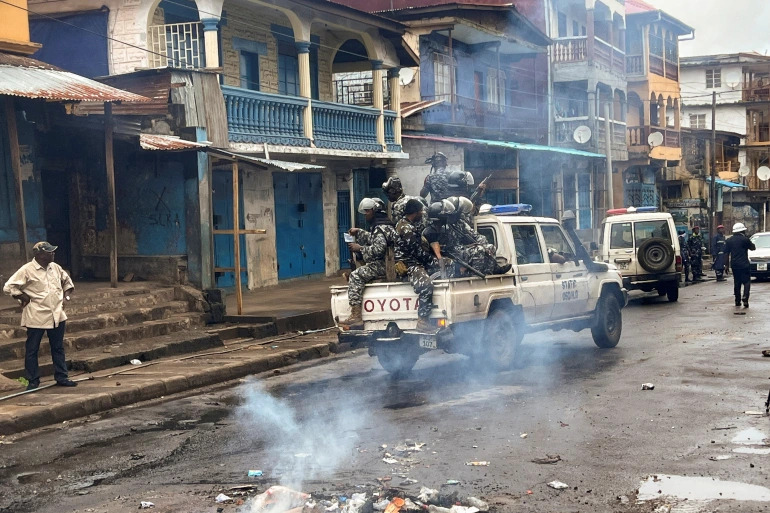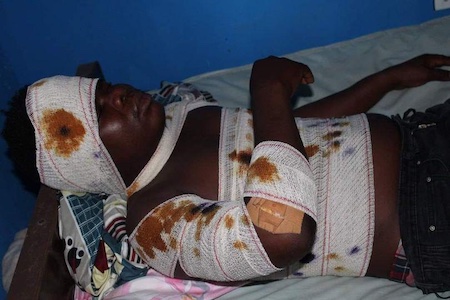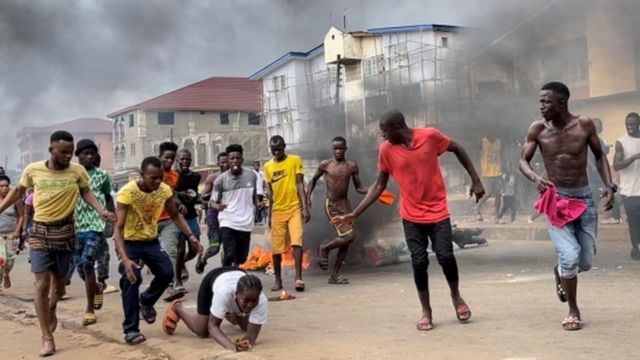Over the past two months, at least nine protesters have been killed in Guinea and two in Sierra Leone, where the internet was also disrupted. Street protests have been banned in Guinea and student protesters in Liberia brutalised, as protests turn a deadly minefield in the Mano River states.
Sierra Leone was plunged into grief and chaos on August 10, 2022, when an anti-government protest went horribly wrong, resulting in deaths among the police and civilians. Security forces clashed with a section of the protesters who were burning piles of tyres on the streets and throwing stones at the police who initially used teargas and then fired live bullets. Media reports initially said three people were killed, among them a police officer who was allegedly lynched.
The Media and Public Relations Department of the Police later announced in a press statement that “Four police officers died and four were injured nationwide; 113 suspects were arrested for both North-West and North-East Regions as of now; some public and private property destroyed.” The statement of which the Media Foundation for West Africa (MFWA) has seen a copy was however silent on civilian deaths.
The deadly protests came barely a month after the police assaulted and arrested dozens of women in a crackdown on their protest against the rising cost of living on July 4, 2022.

Several videos posted on social media showed women being beaten and molested in police stations by male police officers. One police officer was heard taunting a detainee “Now you will rot behind bars”.
Later that same day the police arrested Dr Femi Claudius Cole, leader of the Unity Party, on accusation of inciting an illegal protest. She was detained overnight alongside the Chairman of the National Grand Coalition party, Dr Dennis Bright, who had gone to the police station to show solidarity.
The Sierra Leonean authorities’ apparent intolerance for protests is, unfortunately, shared by their Mano River neighbours, Guinea and Liberia.
On May 13, 2022, Guinea’s military junta, le Comité national du rassemblement pour le développement (CNRD), issued a decree banning all street protests and marches and restricting all such gatherings by political and social actors to the headquarters of their organisations.
The military authorities then proceeded to enforce the ban with brutal force. On July 18 and 19, 2022, a coalition of opposition forces organised demonstrations in Conakry in defiance of the ban. The security forces intervened with lethal force with at least four deaths recorded among the protesters. There was further repression on July 28 in which another four protesters died, according to protest organisers, with Amnesty International sources reporting five fatalities, amidst mass arrests.
On August 6, the junta, which took power in a coup on September 5, 2021, dissolved the country’s biggest opposition political group, the Front national pour la defense de la constitution (FNDC), and key architect of the public demonstrations. The move came after the group ruffled the feathers of the junta by rejecting its three years’ timetable for a return to constitutional order and organizing street demonstrations against the long transitional period, despite the ban on public protests. The FNDC was formed in 2019, with the primary aim of coordinating mass opposition campaigns against President Alpha Conde’s third term bid. Although the group could not stop President Conde from manipulating his way to a controversial victory for a third mandate, it continued to oppose the government, creating the atmosphere of mass discontent that led to the military intervention.
Liberia completed the Mano River region’s descent into anarchy when the ruling Coalition for Democratic Change unleashed its militants on demonstrators in Monrovia on July 26, 2022. The thugs disrupted the peaceful march of students of the University of Liberia’s Student Unification Party (SUP) by violently attacking them outside the United States Embassy. In an incident that became the poster image of the atrocities, an outspoken member of the SUP, Christopher Walter Sisulu Sivili, was seen being tortured by a mob. The activist sustained head injuries, a bleeding face and broken limbs. He has consequently been flown abroad in critical condition for medical treatment.

The MFWA is appalled at these flagrant violations that belong to the bygone days of autocratic governance. Public protests are a legitimate channel for expressing opinions, including dissenting opinions. It is a right guaranteed by the laws of the three countries involved and under international frameworks to which they have assented. We, therefore, urge the leadership of these countries to demonstrate more tolerance for dissenting opinions, including those expressed through street marches. We call for probes into the mayhem that marred the recent demonstrations in these countries. While excesses on the part of protesters cannot be excused, the onus rests with the authorities to ensure that police response to protester excesses are not fatal. We urge the government of Liberia to investigate the assault on Christopher Walter Sisulu and bring his assailants, most of whom were captured on camera, to justice.
The MFWA finds the dissolution of the FNDC by the Guinean authorities untenable and suggestive of the junta’s resolve to silence all opposition to its rule. Similarly, we deplore the ban on public protests and the deadly crackdown on protesters by the military regime which came promising national conciliation. We call for dialogue and consensus building among all stakeholders in Guinea to ensure a credible timetable towards restoring constitutional order. Above all, the governments should provide law enforcement agencies with non-lethal incapacitating weapons for use in appropriate situations.





